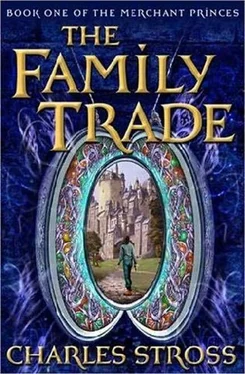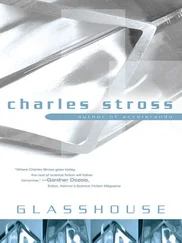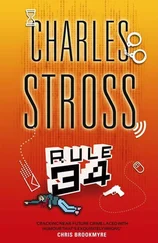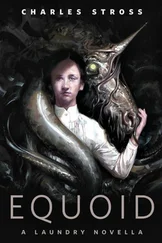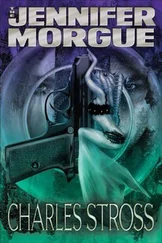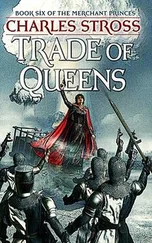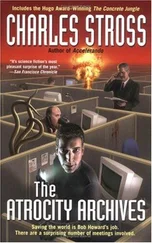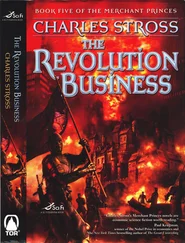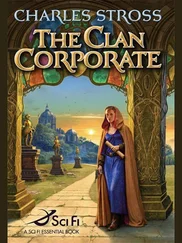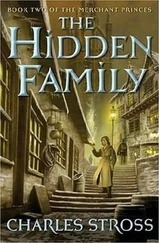Miriam unfolded the uppermost sheet; it crackled slightly with age as she read it. unknown woman found stabbed, baby taken into custody. It gave her a most peculiar feeling. She’d known about it for many years, of course, but this was like seeing it for the first time in a history book, written down in black and white. “They still don’t know who she was?” Miriam asked.
“Why should they?” Iris looked at her oddly. “Sometimes they can reopen the case when new evidence comes to light, or do DNA testing, but after thirty-two years most of the witnesses will have moved away or died. The police officers who first looked into it will have retired. Probably nothing happens unless a new lead comes up. Say, they find another body or someone confesses years later. It’s just one of those terrible things that sometimes happen to people. The only unusual thing about it was you.” She looked at Miriam fondly.
“Why they let two radicals, one of them a resident alien and both of them into antiwar protests and stuff like that, adopt a baby-” Miriam shook her head. Then she grinned. “Did they think I would slow you down or something?”
“Possibly, possibly. But I don’t remember being asked any questions about our politics when we went to the adoption agency-it was much easier to adopt in those days. They didn’t ask much about our background except whether we were married. We didn’t save the newspapers at the time, by the way. Morris bought them as morgue copies later.”
“Well.” Miriam replaced the news clipping, put the lid back on the box, and contemplated it. “Ancient history.”
“You know, if you wanted to investigate it-” Iris was using that look on her, the penetrating diamond-tipped stare of inquisition, the one Miriam tried to think herself into when interviewing difficult customers-“I bet a journalist of your experience would do better than some doughnut stuffed policeman on a routine job. Don’t you think?”
“I think I really ought to help my real mother figure out what she’s going to do about not going stir-crazy while she gets better,” Miriam replied lightly. “There are more immediate things to investigate, like whether your tea is cold and if there are any cookies in the kitchen. Why don’t we leave digging up the dead past for some other time?”
Slippers
Miriam drove away slowly, distractedly, nodding in time to the beat of the wind-shield wipers. Traffic was as bad as usual, but nothing untoward penetrated her thoughts.
She parked, then hunched her shoulders against the weather and scurried to her front door. As usual, her keys got muddled up. Why does this always happen when I’m in a hurry? She wondered. Inside, she shook her way out of her raincoat and jacket like a newborn moth emerging from its sodden cocoon, hung them on the coat rail, then dumped her shoulder bag and the now-damp cardboard box on the old telephone table and bent to unzip her boots. Free of the constraints of leather, her feet flexed luxuriously as she slid them into a pair of battered pink slippers. Then she spotted the answering machine’s blinking light. “You have new messages,” she sang to herself, slightly manic with relief at being home. “Fuck ’em.” She headed for the kitchen to switch on the coffeepot, then poured a mug and carried it into her den.
The den had once been the dining room of this suburban home, a rectangular space linked to the living room by an archway and to the kitchen by a serving hatch. Now it was a cramped office, two walls jammed with bookcases and a third occupied by a huge battered desk. The remaining wall was occupied by a set of french windows opening onto the rear deck. Rain left twisting slug trails down the windows, kicking up splashes from the half-submerged ceramic pots outside. Miriam planted the coffee mug in the middle of the pile of stuff that accumulated on her desk and frowned at the effect. “It’s a mess,” she said aloud, bemused. “How the hell did it get this untidy?”
‘This is bad” she said, standing in front of her desk. “You hear me?” The stubborn paperwork and scattering of gadgets stubbornly refused to obey, so she attacked them, sorting me letters into piles, opening unopened mail and discarding the junk, hunting receipts and filing bills. The desk turned out to be almost nine months’ deep in trivia, and cleaning it up was a welcome distraction from having to think about her experience at work. When the desk actually showed a clear surface-and she’d applied the kitchen cleaner to the coffee rings-she started on the e-mail. That took longer, and by the time she’d checked off everything in her in-box, the rain battering on the windows was falling out of a darkening sky as night fell.
When everything was looking shipshape, another thought struck her. “Paperwork. Hmm.” She went through into the hall and fetched the pink and green shoebox. Making a face, she upended it onto the desk. Papers mushroomed out, and something clattered and skittered onto the floor. “Huh?”
It was a paper bag. Something in it, a hard, cold nucleus, had spilled over the edge of the desk. She hunted around for a few seconds, then stooped and triumphantly deposited bag and contents next to the pile of yellowing clippings, rancid photocopies, and creamy documents. One of which, now that she examined it, looked like a birth certificate-no, one of those forms that gets filled in in place of a birth certificate when the full details are unknown. Baby Jane Doe, age approximately six weeks, weight blah, eye colour green, sex female, parents unknown… for a moment Miriam felt as if she was staring at it down a dark tunnel from a long way away.
Ignoring the thing-that-rattled, Miriam went through the papers and sorted these, too, into two stacks. Press clippings and bureaucracy. The clippings were mostly photocopies: They told a simple-if mysterious-tale that had been familiar to her since the age of four. A stabbing in the park. A young woman-apparently a hippie or maybe a Gypsy, judging by her strange clothes-found dead on the edge of a wooded area. The cause of death was recorded as massive blood loss caused by a deep wound across her back and left shoulder, inflicted by some kind of edged weapon, maybe a machete. That was unusual enough. What made it even more unusual was the presence of the six-week-old baby shrieking her little heart out nearby. An elderly man walking his dog had called the police. It was a seven-day wonder.
Miriam knew the end to that story lay somewhere in Morris and Iris Beckstein’s comforting arms. She’d done her best to edit this other dangling bloody end to the story out of her life. She didn’t want to be someone else’s child: She had two perfectly good parents of her own, and the common assumption that blood ties must be thicker than upbringing rankled. Iris’s history taught better-the only child of Holocaust refugees settled in an unfriendly English town after the war, she’d emigrated at twenty and never looked back after meeting and marrying Morris.
Miriam shook out the contents of the paper bag over the not-quite birth certificate. It was a lens-shaped silver locket on a fine chain. Tarnished and dull with age, its surface was engraved with some sort of crest of arms: a shield and animals. It looked distinctly cheap. “Hmm.” She picked it up and peered at it closely. This must be what Ma told me about, she thought. Valuable? There was some sort of catch under the chain’s loop. “I wonder…”
She opened it.
Instead of the lover’s photographs she’d half-expected, the interior of the shell contained a knotwork design, enamel painted in rich colours. Curves of rich ochre looped and inter-penetrated, weaving above and beneath a branch of turquoise. The design was picked out in silver-it was far brighter than the exposed outer case had suggested.
Читать дальше
